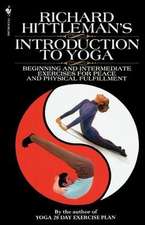Radical Honesty: How to Transform Your Life by Telling the Truth
Autor Brad Blantonen Limba Engleză Paperback – 28 feb 2005
Preț: 88.41 lei
Nou
Puncte Express: 133
Preț estimativ în valută:
16.92€ • 17.41$ • 14.04£
16.92€ • 17.41$ • 14.04£
Carte indisponibilă temporar
Doresc să fiu notificat când acest titlu va fi disponibil:
Se trimite...
Preluare comenzi: 021 569.72.76
Specificații
ISBN-13: 9780970693846
ISBN-10: 0970693842
Pagini: 277
Dimensiuni: 154 x 230 x 16 mm
Greutate: 0.41 kg
Ediția:Revised
Editura: Radical Honesty, Sparrowhawk
ISBN-10: 0970693842
Pagini: 277
Dimensiuni: 154 x 230 x 16 mm
Greutate: 0.41 kg
Ediția:Revised
Editura: Radical Honesty, Sparrowhawk
Descriere
This new edition of the source book for the whole Radical Honest movement includes Brad Blanton's accumulated observations since 1994 of those people whose lives have been transformed by getting out of the self-made jails of their minds, and into the truth they have always known.
Extras
Levels of Telling the Truth
"Oh, but I was so much older then; I'm younger than that now." --Bob Dylan
KATHLEEN WAS 35 YEARS OLD and head of her own interior decorating business; hardworking, competent, pretty, and bright--a survivor. Her business was going great and she was getting rich. She came to me because, in spite of the appearance of great success, she was hypertensive, unable to have orgasms, suffering from insomnia, frenetic about work, and depressed about not having any intimate relationships with men. She came from a large Catholic family. She had been stuck in early adolescence for years and was destined to stay there for the remainder of her life, as many parochial school students do, having learned from the nuns that the most important thing in life was to put on an act for parents and overseers and live your real life on the side. You have a public life and a secret life; keep it that way.
Eight years earlier, she had gotten an abortion, hiding it from her pro-life, Catholic family. She had told no one about it except the man who impregnated her, and she had soon broken up with him. She had guarded her secret well through two years of individual psychotherapy with another therapist and many intensive groups where there had been opportunities for telling the truth. First she told me. Then she told members of a therapy group. Then she told her friends. Then she told her sister. Each increment of revelation brought a degree of self-forgiveness and freedom. Each increment of lightening up about her dark secret helped quite a bit, but it wasn't enough. I encouraged her to finish with the matter by telling the truth to her parents. She desisted for some time, and finally I told her she had either to do it or get out of therapy. She agreed to tell them.
She made several trips home with the intention of having a completely honest conversation with her folks, but she would get scared and come back without having spoken a word. After many failed attempts, she finally told her parents about the abortion. Because of the number of times she had gone home and retreated without telling, the first thing her father said when she finally came out with it was "Oh, thank God," because he and her mother had already secretly concluded that Kathleen probably had a terminal disease she couldn't bring herself to tell them about. After the topic was broached and a discussion ensued about why Kathleen and all the other children lied to them all of the time, the brother who was in town was called over, and the family had quite a long discussion about who everyone was, about sharing and about the games the kids had played with the parents and the secrets they had kept among themselves. This conversaion with her family was a breakthrough in her psychotherapy.
Kathleen no longer has asthma. A few months after that trip home, she began living with a man to whom she is now married. She has orgasms almost every time they have sex. She can sleep. She runs her business and takes time off as she likes. She is even more successful but not miserable anymore. She has accomplished the first level of telling the truth.
Kathleen stepped out from behind her "good daughter" role, which she had maintained by hiding and lying all of the time, risked her relationship to her parents for the sake of revealing who she really was, and ended up transforming not only her own way of being in the world but that of her whole family.
Roles are like clothing we learned to put on to protect ourselves from the cold. When we take off the roles we have been hiding behind the naked being we are stands there--vulnerable and defenseless. The being we are, as distinct from the roles we've been playing, doesn't need the defensive weapons we invented to scare the enemy away. Those other people out there are naked under their roles too--they are playing possum, or creating a stink, or baring their fangs and growling, or signaling anger and threatening like a chimp, or running like a rabbit. Their roles were developed for the sake of survival, just as our roles were.
The difference between our survival tactics and those of animals is that theirs are necessary for the continuation of their physical existence, and ours are not. But we act as though ours were. We conceal ourselves because we fear that the pain accompanying the act of self-disclosure will literally destroy us, or fundamentally damage our being in some horrible way, rendering us maimed and dysfunctional. In addition, we fear we may destroy others with our truth-telling. Kathleen recoiled for years from what she saw as the utterly destructive power of her unleashed secret--it would, she thought, "kill" her parents and herself to have it told. But telling the truth kills nothing but false roles, images, interpretations, and lies, as Kathleen discovered. It only kills those deceits which we had kept alive through strategic self-concealment. "Kathleen,"--her false image--did not survive her revelation. But Kathleen did. Through telling the truth, she revealed herself, and thus delivered herself and her family into a new and more powerful relationship, achieved through the death of the old, lying relationship.
The ability to "get naked" in front of other people who are still in their roles, as Kathleen did, is important. Coming out from behind our roles permits us to look behind the roles of others. Because we can see more clearly, the threat of other people, posing in their roles, fades. Once we come out from behind our pose, what used to scare us about other people doesn't scare us anymore. Coming off it, dropping the roles we thought we needed for protection, turns out to be not only safe, but a place of power. Kathleen got less scared of other people, particularly men.
Intimacy is a power grown into after adolescence. The person capable of intimacy--that is, the person capable of telling the truth--still has roles to play, but is no longer trapped by them. The integrated person behind the role no longer has anything to hide, and can relate freely to the being he knows is hidden behind the roles others are playing. The person is then in charge, rather than the role.
I differentiate three phases, or levels, of telling the truth. These levels may occur successively, or simultaneously, or a person may master one or two levels and retreat from the next. Often people retreat after encountering the frightening sense of freedom afforded by a breakthrough at a new level. Sometimes they try again later, sometimes not. The three levels are: revealing the facts; honestly expressing current feelings and thoughts; and, finally, exposing the fiction you have devised to represent yourself and your history.
"Oh, but I was so much older then; I'm younger than that now." --Bob Dylan
KATHLEEN WAS 35 YEARS OLD and head of her own interior decorating business; hardworking, competent, pretty, and bright--a survivor. Her business was going great and she was getting rich. She came to me because, in spite of the appearance of great success, she was hypertensive, unable to have orgasms, suffering from insomnia, frenetic about work, and depressed about not having any intimate relationships with men. She came from a large Catholic family. She had been stuck in early adolescence for years and was destined to stay there for the remainder of her life, as many parochial school students do, having learned from the nuns that the most important thing in life was to put on an act for parents and overseers and live your real life on the side. You have a public life and a secret life; keep it that way.
Eight years earlier, she had gotten an abortion, hiding it from her pro-life, Catholic family. She had told no one about it except the man who impregnated her, and she had soon broken up with him. She had guarded her secret well through two years of individual psychotherapy with another therapist and many intensive groups where there had been opportunities for telling the truth. First she told me. Then she told members of a therapy group. Then she told her friends. Then she told her sister. Each increment of revelation brought a degree of self-forgiveness and freedom. Each increment of lightening up about her dark secret helped quite a bit, but it wasn't enough. I encouraged her to finish with the matter by telling the truth to her parents. She desisted for some time, and finally I told her she had either to do it or get out of therapy. She agreed to tell them.
She made several trips home with the intention of having a completely honest conversation with her folks, but she would get scared and come back without having spoken a word. After many failed attempts, she finally told her parents about the abortion. Because of the number of times she had gone home and retreated without telling, the first thing her father said when she finally came out with it was "Oh, thank God," because he and her mother had already secretly concluded that Kathleen probably had a terminal disease she couldn't bring herself to tell them about. After the topic was broached and a discussion ensued about why Kathleen and all the other children lied to them all of the time, the brother who was in town was called over, and the family had quite a long discussion about who everyone was, about sharing and about the games the kids had played with the parents and the secrets they had kept among themselves. This conversaion with her family was a breakthrough in her psychotherapy.
Kathleen no longer has asthma. A few months after that trip home, she began living with a man to whom she is now married. She has orgasms almost every time they have sex. She can sleep. She runs her business and takes time off as she likes. She is even more successful but not miserable anymore. She has accomplished the first level of telling the truth.
Kathleen stepped out from behind her "good daughter" role, which she had maintained by hiding and lying all of the time, risked her relationship to her parents for the sake of revealing who she really was, and ended up transforming not only her own way of being in the world but that of her whole family.
Roles are like clothing we learned to put on to protect ourselves from the cold. When we take off the roles we have been hiding behind the naked being we are stands there--vulnerable and defenseless. The being we are, as distinct from the roles we've been playing, doesn't need the defensive weapons we invented to scare the enemy away. Those other people out there are naked under their roles too--they are playing possum, or creating a stink, or baring their fangs and growling, or signaling anger and threatening like a chimp, or running like a rabbit. Their roles were developed for the sake of survival, just as our roles were.
The difference between our survival tactics and those of animals is that theirs are necessary for the continuation of their physical existence, and ours are not. But we act as though ours were. We conceal ourselves because we fear that the pain accompanying the act of self-disclosure will literally destroy us, or fundamentally damage our being in some horrible way, rendering us maimed and dysfunctional. In addition, we fear we may destroy others with our truth-telling. Kathleen recoiled for years from what she saw as the utterly destructive power of her unleashed secret--it would, she thought, "kill" her parents and herself to have it told. But telling the truth kills nothing but false roles, images, interpretations, and lies, as Kathleen discovered. It only kills those deceits which we had kept alive through strategic self-concealment. "Kathleen,"--her false image--did not survive her revelation. But Kathleen did. Through telling the truth, she revealed herself, and thus delivered herself and her family into a new and more powerful relationship, achieved through the death of the old, lying relationship.
The ability to "get naked" in front of other people who are still in their roles, as Kathleen did, is important. Coming out from behind our roles permits us to look behind the roles of others. Because we can see more clearly, the threat of other people, posing in their roles, fades. Once we come out from behind our pose, what used to scare us about other people doesn't scare us anymore. Coming off it, dropping the roles we thought we needed for protection, turns out to be not only safe, but a place of power. Kathleen got less scared of other people, particularly men.
Intimacy is a power grown into after adolescence. The person capable of intimacy--that is, the person capable of telling the truth--still has roles to play, but is no longer trapped by them. The integrated person behind the role no longer has anything to hide, and can relate freely to the being he knows is hidden behind the roles others are playing. The person is then in charge, rather than the role.
I differentiate three phases, or levels, of telling the truth. These levels may occur successively, or simultaneously, or a person may master one or two levels and retreat from the next. Often people retreat after encountering the frightening sense of freedom afforded by a breakthrough at a new level. Sometimes they try again later, sometimes not. The three levels are: revealing the facts; honestly expressing current feelings and thoughts; and, finally, exposing the fiction you have devised to represent yourself and your history.

























